#note: hou liang.
Explore tagged Tumblr posts
Text
Sword Snow Stride (2021) - 雪中悍刀行 - Whump List
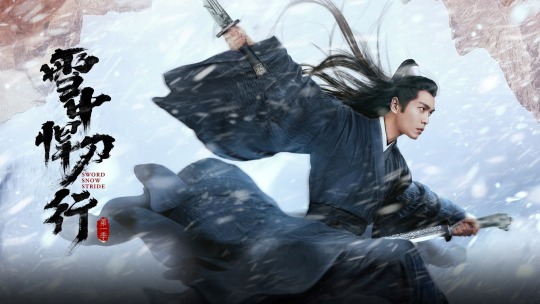
List by StayDandy Synopsis : In a time of turmoil, Xu Xiao rises as King of Northern Liang, defeating threats from steppe kingdoms and southern uprisings. His heir, Xu Fengnian, a free-spirited warrior, has spent years mastering his skills while forming alliances. Among the royal household is Jiang Ni, a princess from a rival kingdom who may harbor hidden motives. As Xu Fengnian ascends the throne, doubts arise about his ability to uphold his father’s legacy. When a critical campaign looms, the fate of the realm hangs in the balance. (MDL) AKA : The Snowy Path of the Heroic Blade | Sword in the Snow | Knife in the Snow | Knives in the Snow
Whumpee : Xu Feng Nian played by Zhang Ruo Yun
Country : 🇨🇳 China Genres : Wuxia, Fantasy, Melodrama, Historical
Notes : This is a Full Whump List • Adapted from web novel "The Snowy Path of the Heroic Blade" (雪中悍刀行) by Feng Huo Xi Zhu Hou (烽火戏诸侯) • I must admit, I did not really read the synopsis before watching and had no clue that that father/son were king/heir - even though throughout the entire show Fengnian is addressed as "highness" (eng translation) - it just never clicked until I made this post 😂. I totally forgot that even though there's an emperor in that time, there's still kings under the emperor.
Episodes on List : 12 Total Episodes : 38
*Spoilers below*
02 : Xu Feng Nian carried
08 : (past halfway point) Knocked out
09 : (near end) Hand bleeding from over practicing with sword … hand bandaged
10 : (near end) Given a transference of power; pushed into a lake, drowning
11 : … continued from previous ep. ... Given a transference of power, passes out … (past halfway point) knees buckle (comedic)
21 : (near end) Attacked, thrown back, spits up blood, fight.. collapses, coughs up blood, passes out
22 : … continued from previous ep. ... Told his meridians are reversed, which will lead to his death.. hiding his injuries.. pale, unsteady … bleeding from the corners of his eyes … attempting to fix meridians, crying out in extreme pain, raspy breathing
24 : Passes out, wounded & bleeding from an attack (not shown) … wound cared for … went out to meet someone despite still being hurt, weak, pale
26 : (near end) Shaking after performing difficult sword move
28 : Entranced, nightmare
37 : Attacked, passes out
38 : (past halfway point) Fight, coughs up blood, choked
#whump#whump list#full whump list#Asian whump#China#Sword Snow Stride#雪中悍刀行#The Snowy Path of the Heroic Blade#Sword in the Snow#Knife in the Snow#Knives in the Snow#Xu Feng Nian#Zhang Ruo Yun
20 notes
·
View notes
Text
today, i wanna talk about this point that i've referenced a couple times across my yrzx fics:
For the fate of the world, Wang Ye relinquished his days of peace and tranquility. To save Zhuge Qing’s life, Wang Ye could sacrifice everything beneath the heavens. (from 岁月不待人 | the moon and the tides, you and i)
i'll start during Beijing arc, when ZCL asks why WY doesn't just give up Feng-hou Qimen to the ppl who want it.
in the manhua (ch. 185) & donghua (s3, ep. 3), WY's response is vague: "for various reasons, i can't give out [that power]."
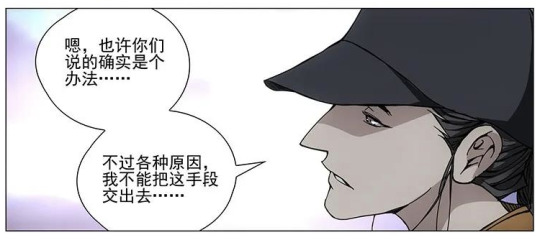
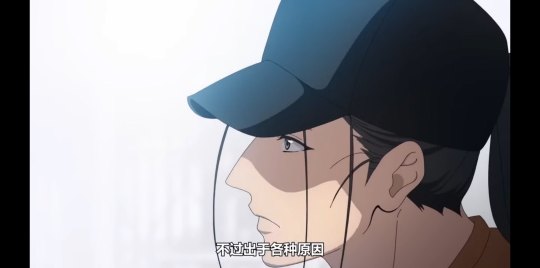
(note that the dialogue differs slightly btwn these two adaptations, but the meaning is the same)
but in the live-action (s1, ep. 22), WY clearly explains that "it would throw the ways of this world into greater disorder. this calamitous fate must be shouldered by me alone."
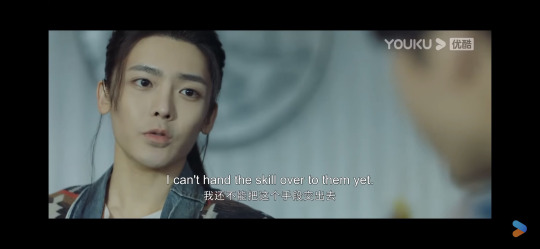
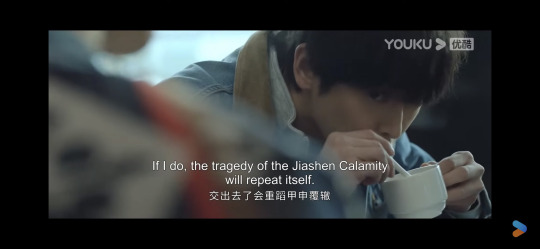
these lines perfectly demonstrate one of WY's most defining traits: 心怀天下 / a heart that cradles everything beneath the heavens.
we see it first during the tournament arc, when WY admits to ZCL that he didn't need to get involved in this mess—but did so anyway because the fate of the world was implicated.
WY: Actually, whatever happens to you all has nothing to do with me. No matter how terrible the world ends up, I can still protect myself and my family and keep us unscathed. So, actually, I shouldn't have come here. [...] ZCL: What you mean is that if I continue my investigation, the future of this world may very likely develop in a bad direction. Daozhang, who this "bad future" impacts isn't limited to only me, right? The two of us are neither kin nor kith; you wouldn't have come to get caught up in these troubled waters because of me, right? WY: This, involves another concept. I call it the weight of fate. [...] And you, Zhang Chulan, you hold a high ratio of that weight. Your choice will change the fates of many, many people. (LA s1, ep. 14; see also manhua chs. 121-122 & donghua s2, ep. 12)
this is the extent of WY's selflessness. and as his conversation w ZCL continues, something else is revealed to us.
ZCL: The you who could have stayed out of this matter entirely chose instead to come here and persuade me. Did you also not choose the future that would have been best for you? (LA s1, ep. 14)
that 'something' is none other than WY's conduct: 明知山有虎,偏向虎山行 / knowing full well the mountains harbor tigers, yet insisting on traveling deep into the mountains anyway. or, in other words, the practice of forging on into promised danger.
which, coincidentally, is exactly how WY praised Zhuge Liang's character during his match against ZGQ.
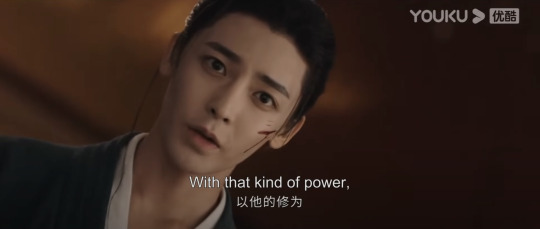
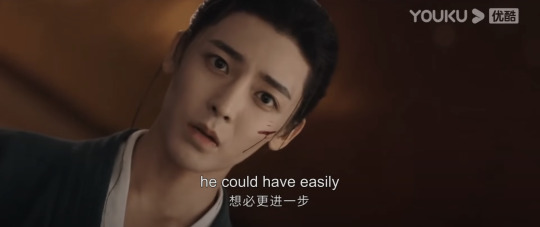
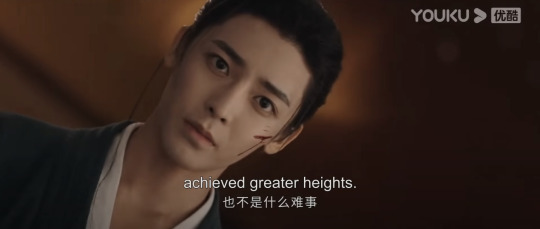
可他却放弃了作为一个修者该坚守的一切。就算逆大势而行,也要投身到乱世当中,只为了去救那个明知已无可救药的天下。/ But he chose to give up everything that a cultivator should uphold and protect. Even if it meant opposing the momentum of the times, he threw himself utterly into chaos of the mortals—all to save a world he knew full well was beyond redemption. 为了那个天下情愿去和天理和大势对抗 / For that world, he was willing to hold off divine order and destiny itself. 明知不可为而为,这就是他那个级别的术士作为。/ To do something knowing full well of its impossible nature—this was the practice of a sorcerer of his caliber. (LA s1, ep. 13; see also manhua ch. 110 & donghua s2, ep. 10)
with such a heart of compassion (怜悯之心, HMH's words) and sense of responsibility, WY is unlike anyone else in his generation. instead, it can be argued that the character most similar to WY is in fact one of his seniors, lao-Tianshi.
they are, at least in the LA, the only two 麒麟 in the story after all (s1, eps. 8 & 20):
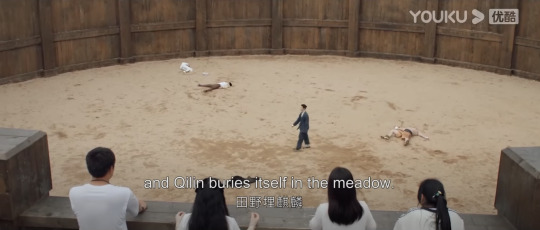
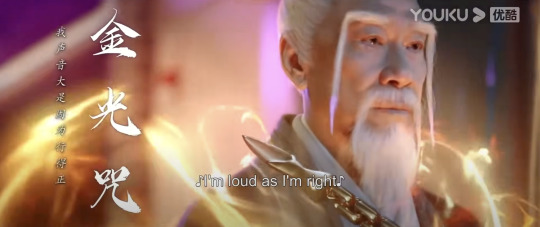
and just like lao-Tianshi, it's easy to think of WY as a saint (圣人) or a god—something "above" mortal humans. he's operating on a scale (格局) far greater than anyone else in our main cast; WY is always taking the whole world into consideration, even if that's the choice least favorable to him.
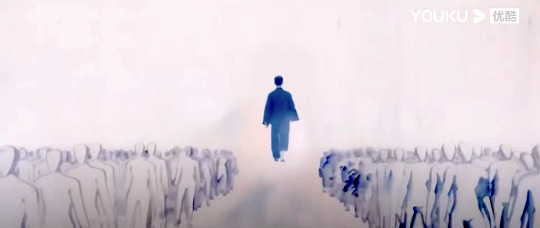
(LA s1, ep. 23)
and then Beijing arc happens. and by the end of it, WY has an epiphany:
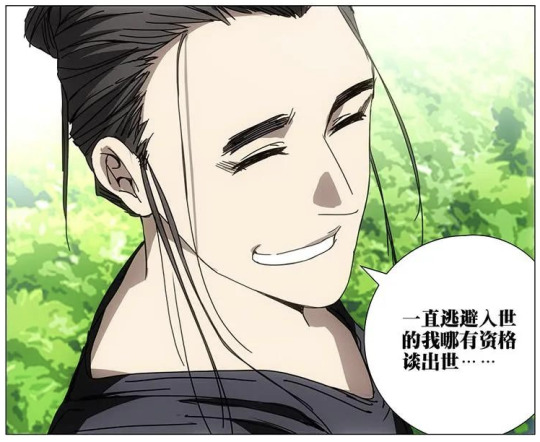
“The me who has always avoided involvement with worldly affairs has no right to speak of leaving them behind.” (manhua ch. 196; see also LA s1, ep. 23 & donghua s3, ep. 7)
he's begun to have a reckoning with his own human-ness. he's starting to realize that he's fallible, that he's ordinary and secular, that he has attachments—and, importantly, that he wants attachments. that he desires companionship (just as humans are wont to do).
and it's with that moment of enlightenment that we dive into Biyou Village arc.
because, overall, WY has not actually changed that much. he still feels responsible for the peace and safety of the world; he still wants to figure out how ZCL and FBB are related to the Jiashen Calamity. he still remembers clearly what Hong-ye said: "you are the chosen one." (LA s1, ep. 4)
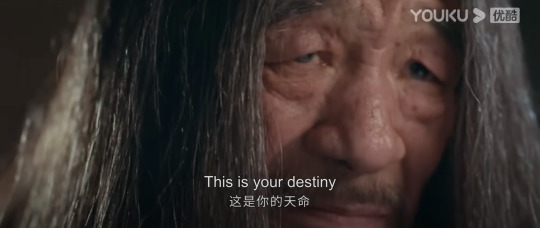
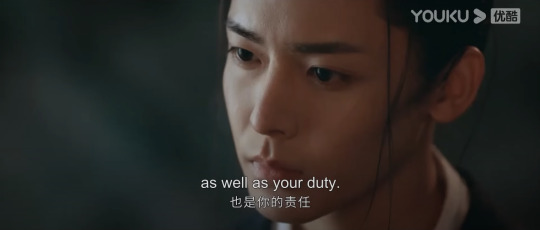
and even ZGQ himself remarks (manhua ch. 228; see also donghua s4, ep. 5):
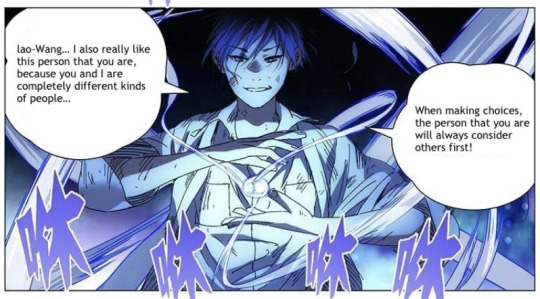
yet when ZGQ's safety is at stake, WY doesn't hesitate for even a moment:
(donghua s4, ep. 5; see also manhua ch. 228)
that is not the conduct of someone who always thinks about the bigger scheme of things. that's the conduct of someone making a choice for himself, an arguably selfish choice, to save his friend and doom everyone else.
WY would sooner give up his Feng-hou Qimen and restart the Jiashen Calamity than see ZGQ in danger. that is how important ZGQ is to WY.
在王也的心中,诸葛青的命比天下苍生还重要。/ in Wang Ye's heart, Zhuge Qing's life is more important than everyone in beneath the heavens.
and that's because ZGQ is the first of his generation to approach him. to make an effort to befriend him. to look beyond the power he possesses and also see him.
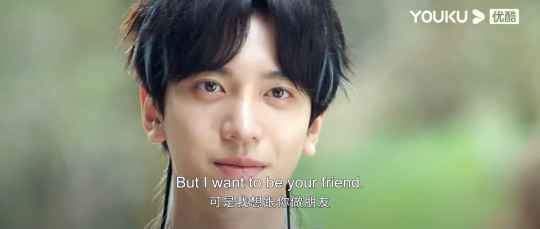
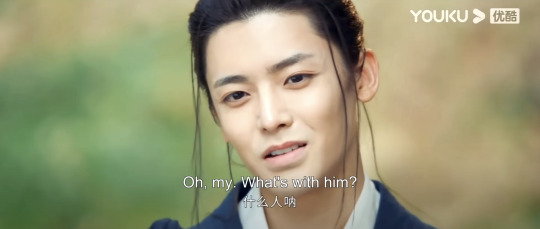
(LA s1, ep. 15; see also manhua ch. 131 & donghua s2, ep. 14)
in other words, it was ZGQ who made WY's godlike love for the world human. WY is no longer an outside viewer looking down on the plane he feels beholden to; WY is a part of this secular world, and that is why he should want to protect it.
because the red dust realm is where ZGQ exists. here is where their bond exists.
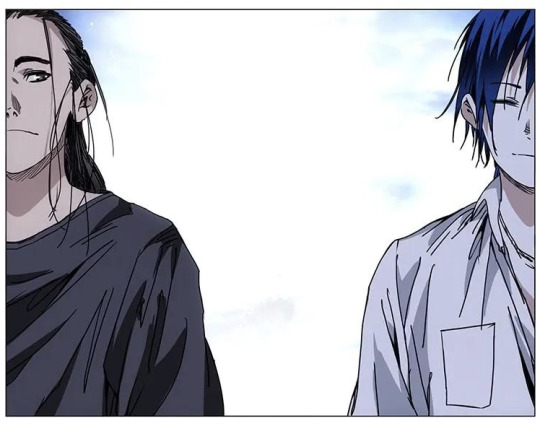
(unrelated pic from manhua ch. 196; see also donghua s3, ep. 7)
tldr: Wang Ye places the world before himself, and Zhuge Qing before the world.
— all this to say, i really am excited for s2 of the live-action, even though the casting rumors have been disheartening. Biyou Village arc is a climactic chapter for YeQing, so i hope the adaptation does it justice.
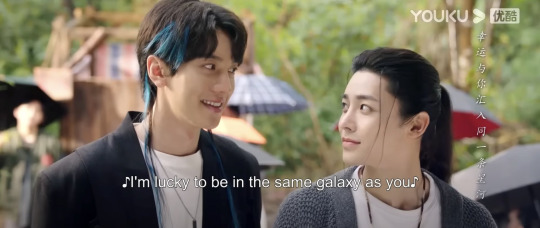
(LA s1, ep. 27)
#异人之下#i am nobody#cdrama ramblings#yeqing#一人之下#hitori no shita#crossposted from twitter but this version is much longer lol#does this count as meta? i always hesitate to use that word bc i read other ppl's stuff and im like WOW#THAT'S MINDBLOWING#but i feel like this is just 'they really really care a lot about each other please cry with me'
43 notes
·
View notes
Text
KRONOS posa para a Naver x Dispatch
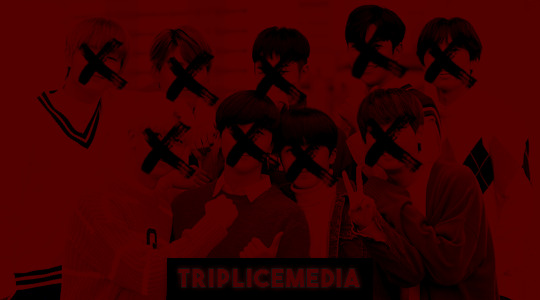
O boygroup Kronos, formado pelo programa de sobrevivência H Producer, fez um ensaio fotográfico para o NAVER x Dispatch e deu uma entrevista.
Eles falaram sobre o conceito do grupo, a experiência no H Producer, o que as canções Magia e Oblivion passam e o single album Neverland.
O ensaio foi ao ar livre com os nove rapazes posando em um parque no centro de Seul. Os trajes eram leves e despojados para combinar com o verão e suas idades.
O fotógrafo destacou a boa desenvoltura dos garotos e sua vontade em aprender a modelar, além claro, sua ótima educação.
para comentar a notícia, nos mandem uma ask com a tag: #noteth502.
#note: kronos.#note: haven.#note: h.m.#note: h.light.#note: moon dokeun.#note: hou liang.#note: choi daejung.#note: yhukon inchaeron.#note: lee yunho.#note: nate huang.#note: huang guanyu.#noteth502.
2 notes
·
View notes
Text
How To Name Your Chinese Characters:
1) LAST NAMES:
I’ve pasted the Top 100 common last names in alphabetical order, and bolded the ones that appear in CQL:
B: 白 Bai C: 蔡 Cai ; 曹 Cao ; 常 Chang ; 曾 Ceng ; 陈 Chen ; 程 Cheng ; 崔 Cui ; D: 戴 Dai ; 邓 Deng ; 丁 Ding ; 董 Dong ; 杜 Du ; F: 范 Fan ; 方 Fang ; 冯 Feng ; 付 Fu ; G: 高 Gao ; 葛 Ge ; 龚 Gong ; 顾 Gu ; 郭 Guo ; H: 韩 Han ; 何 He ; 贺 He 洪 Hong ; 侯 Hou ; 黄 Hua ; 胡 Hu ; J: 贾 Jia ; 蒋 Jiang ; 姜 Jiang ; 江 Jiang ; 金 Jin ; K: 康 Kang ; L: 赖 Lai ; 李 Li ; 黎 Li ; 廖 Liao ; 梁 Liang ; 林 Lin ; 刘 Liu ; 陆 Lu ; 卢 Lu ; 路 Lu ; 吕 Lü ; 罗 Luo ; M: 马 Ma ; 麦 Mai ; 毛 Mao ; 孟 Meng ; N: 倪 Ni ; 牛 Niu ; P: 潘 Pan ; 彭 Peng ; Q: 钱 Qian ; 秦 Qin ; 邱 Qiu ; R:任 Ren ; S: 邵 Shao ; 沈 Sheng ; 史 Shi ; 石 Shi ; 施 Shi ; 宋 Song ; 苏 Su ; 孙 Sun ; T: 陶 Tao ; 谭 Tan ; 唐 Tang ; 田 Tian ; W: 万 Wan ; 王 Wang ; 汪 Wang ; 魏 Wei ; 吴 Wu ; X: 邢 Xing ; 夏 Xia ; 蕭 Xiao ; 谢 Xie ; 徐 Xu ; 许 Xu ; 薛 Xue ; Y: 阎 Yan ; 严 Yan ; 杨 Yang ; 姚 Yao ; 叶 Ye ; 余 Yu ; 于 Yu ; 袁 Yuan ; Z: 张 Zhang ; 赵 Zhao ; 郑 Zheng ; 钟 Zhong ; 周 Zhou ; 朱 Zhu ; 庄 Zhuang ; 邹 Zou ;
Above are all single character last names, but there are some double character Chinese last names, seen below (list not exhaustive):
独孤 Du’Gu ; 公孙 Gong’Sun ; 南宫 Nan’Gong 欧阳 Ou’Yang ; 司马 Si’Ma ; 上官 Shang’Guan ; 宇文 Yu’Wen ; 长孙 Zhang’Sun ; 诸葛 Zhu’GE ;
2) GIVEN NAMES/COURTESY NAMES
《Elements》:
Light*: 光 (guāng) - light, 亮 liàng - bright / shine, 明 (míng) - bright, 曦 (xī) - early dawn, 昀 (yún) - daylight, 昭 (zhāo) - light, clear,照 (zhào) - to shine upon,
Fire: 焰 (yàn) - flames, 烟 (yān) - smoke,炎 (yán) - heat/burn, 烨 (yè) - dazzling light,
Water: also see “weather” OR “bodies of water” under nature; note the words below while are related to water have meanings that mean some kind of virtue: 清 (qīng) - clarity / purity, 澄 (chéng) - clarity/quiet, 澈 (chè) - clear/penetrating, 涟 (lián) - ripple, 漪 (yī) - ripple, 泓 (hóng) - vast water, 湛 (zhàn) - clear/crystal, 露 (lù) - dew, 泠 (líng) - cool, cold, 涛 (tāo) - big wave,泽 (zé),浩 hào - grand/vast (water),涵 (han) - deep submergence / tolerance / educated
Weather: 雨 (yǔ) - rain, 霖 (lín) - downpouring rain, 冰 (bīng) - ice, 雪 (xuě) - snow, 霜 (shuāng) - frost
Wind: 风 (fēng) - wind
* some “Light” words overlap in meaning with words that mean “sun/day”
《Nature》:
Season: 春 (chūn) - spring, 夏 (xià) - summer, 秋 (qíu) - aumtum, 冬 (dōng) - winter
Time of Day: 朝 (zhāo) - early morning / toward, 晨 (chén) - morning / dawn, 晓 (xiǎo) - morning, 旭 (xù) - dawn/rising sun,昼 (zhòu) - day,皖 (wǎn) - late evening,夜 (yè) - night
Star/Sky/Space: 云 (yún) - cloud,天 (tiān) - sky/ heaven,霞 (xiá) - afterglow of a rising or setting sun,月 (yuè) - moon,日 (ri) - day / sun,阳 (yáng) - sun,宇 (yǔ) - space,星 (xīng) - star
Birds: 燕 (yàn) - sparrow, 雁 (yàn) - loon, 莺 (yīng) - oriole, 鸢 (yuān) - kite bird (family Accipitridae),羽 (yǔ) - feather
Creatures: 龙 (lóng) - dragon/imperial
Plants/Flowers:* 兰 (lán) - orchids, 竹 (zhú) - bamboo, 筠 (yún) - tough exterior of bamboos, 萱 (xuān) - day-lily, 松 (sōng) - pine, 叶 (yè) - leaf, 枫 (fēng) - maple, 柏 bó/bǎi - cedar/cypress, 梅 (méi) - plum, 丹 (dān) - peony
Mountains: 山 (shān), 峰 (fēng) - summit, 峥 (zhēng),
Bodies of water: 江 (jiāng) - large river/straits, 河 (hé) - river, 湖 (hú) - lake, 海 (hǎi) - sea, 溪 (xī) - stream, 池 (chí) - pond, 潭 (tán) - larger pond, 洋 (yáng) - ocean
* I didn’t include a lot of flower names because it’s very easy to name a character with flowers that heavily implies she’s a prostitute.
《Virtues》:
Astuteness: 睿 ruì - astute / foresight, 智 (zhi), 慧 (hui), 哲 (zhé) - wise/philosophy,
Educated: 博 (bó) - extensively educated, 墨 (mo) - ink, 诗 (shi) - poetry / literature, 文 (wén) - language / gentle / literary, 学 (xue) - study, 彦 (yàn) - accomplished / knowledgeable, 知 (zhi) - to know, 斌 (bīn) - refined, 赋 (fù) - to be endowed with knowledge
Loyalty: 忠 (zhōng) - loyal, 真 (zhēn) - true
Bravery: 勇 (yǒng) - brave, 杰 (jié) - outstanding, hero
Determination/Perseverance: 毅 (yì) - resolute / brave, 恒 (héng) - everlasting, 衡 (héng) - across, to judge/evaluate,成 (chéng) - to succeed, 志 (zhì) - aspiration / the will
Goodness/Kindness: 嘉 (jiā) - excellent / auspicious,磊 (lěi) - rock / open & honest, 正 (zhèng) - straight / upright / principle,
Elegance: 雅 (yǎ) - elegant, 庄 (zhuāng) - respectful/formal/solemn, 彬 (bīn) - refined / polite,
Handsome: 俊 jùn - handsome/talented
Peace: 宁 (níng) - quietness/to pacify, 安 (ān) - peace, safety
Grandness/Excellence:宏 (hóng) - grand,豪 (háo) - grand, heroic,昊 (hào) - limitless / the vast sky,华 (huá) - magnificent, 赫 (hè) - red/famous/great, 隆 (lóng) - magnificent, 伟 (wěi) - greatness / large,轩 (xuān) - pavilion with a view/high,卓 (zhuó) - outstanding
Female Descriptor/Virtues/Beauty: 婉 (wǎn),惠 (huì), 妮 (nī), 娇 (jiāo), 娥 (é), 婵 (chán) (I didn’t include specific translations for these because they’re all adjectives for women meaning beauty or virtue)
《Descriptors》:
Adverbs: 如 (rú) - as,若 (ruò) - as, alike,宛 (wǎn) - like / as though,
Verbs: 飞 (fēi) - to fly, 顾 (gù) - to think/consider, 怀 (huái) - to miss, to possess, 落(luò) - to fall, to leave behind,梦 (mèng) - to dream, 思 (sī) - to consider / to miss (someone),忆 (yì) - memory, 希 (xī) - yearn / admire
Colours: 红 (hóng) - red, 赤 (chì) - crimson, 黄 (huàng) - yellow, 碧 (bì) - green,青(qīng) - azure,蓝 (lán) - blue, 紫 (zǐ) - violet ,玄 (xuán) - black, 白 (baí) - white
Number:一 (yī), 二 (er) - two, 三 (san) - three, 四 (si) - four, 五 (wu) - five, 六 (liu) - six, 七(qi) - seven, 八 (ba) - eight, 九 (jiu) - nine, 十 (shi) - ten
Direction: 东 (dōng) - east, 西 (xi) - west, 南 (nan) - south, 北 (bei) - north,
Other: 子 (zǐ) - child, 然 (rán) - correct / thusly
《Jade》: *there are SO MANY words that generally mean some kind of jade, bc when ppl put jade in their children’s name they don’t literally mean the rock, it’s used to symbolize purity, goodness, kindness, beauty, virtue etc* 琛 (chen), 瑶 (yao), 玥 (yue), 琪 (qi), 琳 (lin)
《Spirituality》
凡 (fan) - mortality
色 (se) - colour, beauty. In buddhism, “se” symbolizes everything secular
了 (liao) - finished, done, letting go
尘 (chen) - dust, I’m not… versed in buddhism enough to explain “chen”, it’s similar to “se”
悟 (wu) - knowing? Cognition? To understand a higher meaning
无 (wu) - nothing, the void, also part of like “letting go”
戒 (jie) - to “quit”, but not in a bad way. In buddhism, monks are supposed to “quit” their earthly desires.
极 (ji) - greatness, also related to the state of nirvana (? I think?)
#cql#the untamed#because i have gotten many many many asks about how to name characters#language#master list
11K notes
·
View notes
Text
DMBJ Weibo
Author of Novels & Screenwriter
Nanpai Sanshu (aka Xu Lei & Kennedy Xu) [worked as a screenwriter on time raiders, tomb of the sea, & reunion]
His company [produced the mystic nine, tomb of the sea, & reunion]
Shows’ Weibo
The Mystic Nine [hasn’t posted since 2018]
The Lost Tomb [hasn’t posted since 2017]
The Lost Tomb 2 [hasn’t posted since 2019]
The Lost Tomb 2.5 [hasn’t posted since Aug. 2021]
Ultimate Note [hasn’t posted since Jan. 2022]
Tomb of the Sea [hasn’t posted since 2019]
Reunion: Sound of the Providence [hasn’t posted since Dec. 2021]
The Mystic Nine: Qing Shan Hai Ting [hasn’t posted since Feb. 2022]
The Mystic Nine Actors
William Chan (Fo Ye)
Zhang Yixing (Er Ye)
Ying Haoming (Ba Ye)
Zhang Mingen (Lt. Zhang) [same as un & sand sea]
Zhao Liying (Yin Xinyue)
Harry Hu (Chen Pi)
Yuan Bingyan (Ya Tou)
The Lost Tomb Actors
Li Yifeng (Wu Xie) [account was deleted in 2022]
Yang Yang (Zhang Qiling)
Liu Tianzuo (Pangzi)
Tiffany Tang (Ning)
Ken Chang (Wu Sanxing)
Wei Wei (Pan Zi)
Li Chenhao (High Shao)
The Lost Tomb 2 Actors
Neo Hou (Wu Xie)
Cheng Yi (Zhang Qiling)
Zhang Boyu (Pangzi) [same as LT2.5]
Li Man (Ning)
Liu Xueyi (Xie Yuchen) [same as LT2.5]
Huang Yi (Huo Xiuxiu) [same as LT2.5]
Peng Yusi (Shun Zi) [same as LT2.5]
Yao Lu (Wu Sanxing) [same as LT2.5, hasn’t uploaded since 2019]
He Zhonghua (Chen Pi) [same as LT2.5]
The Lost Tomb 2.5 Actors
Bai Shu (Wu Xie)
Zhao Dongze (Zhang Qiling)
Zhao Ruihuan (Ning)
Bai Yihong (Pan Zi)
Ultimate Note Actors
Xiao Yuliang (Zhang Qiling) [same as sand sea]
Joseph Zeng (Wu Xie)
Chen Fangxu (Pangzi)
Liu Yuning (Hei Yanjing)
Liu Yuhan (Xie Yuchen)
Zhu Jie (Wang Meng) [same as sand sea]
Hankiz Omar (Ning)
Liu Ruoyan (Huo Xiuxiu)
Leanne Liu (Huo Xiangu)
Wang Jinsong (Wu Erbai)
Fan Ming (Wu Sanxing)
Wan Peixin (Pan Zi)
Tao Luoyi (Chen Wenjin)
Tomb of the Sea/Sand Sea Actors
Wu Lei (Li Cu)
Qin Hao (Wu Xie) [his profile picture is still him as Wu Xie🥺]
Chen Minghao (Pangzi) [same as Reunion]
Zhang Meng (Su Nan)
Yang Rong (Liang Wan)
Yu Hewei (Wu Sanxing)
Wang Haoxuan (Su Wan)
Zhu Jian (Yang Hao)
Kudousi Jiang Ainiwaeris (Kan Jian) [he’s aka Wa Er]
Ji Chen (Hei Yanjing)
Hong Xuan (Yin Nanfeng)
He Longlong (Huo Daofu) [same as reunion]
Yu Kaining (Luo Que)
Reunion Actors
Zhu Yilong (Wu Xie)
Huang Junjie (Zhang Qiling)
Mao Xiaotong (Bai Haotian)
Hu Jun (Wu Erbai)
Baron Chen (Hei Yanjing)
Liu Chang (Liu Sang)
Huang Mengying (Ya Nv)
Fan Yize (Er Jing)
Nathan Yu (Wu Sanxing)
Wu Zenan (Li Jiale)
Wu Lipeng (Jiang Zisuan)
Zhong Jiacheng (Jia Kezi)
#dmbj#daomu biji#the lost tomb#the lost tomb 2#the lost tomb 2.5#ultimate note#tomb of the sea#the mystic nine#reunion: the sound of the providence#tmbj#resources
193 notes
·
View notes
Text
Connections to “The Poppy War”
The setting and characters to The Poppy War has derived a lot of inspiration from historical events and myths alike. This is meant to discuss which characters have a relation to those preexisting. Of course, you do not need to know this information to enjoy the books, but I think knowing them will elevate your reading experience. None of this information is official. This is just the conclusions I came to while reading. Feel free to make comments
MAJOR MAJOR SPOILERS FOR ALL BOOKS
Locations
Nikara: Qing Dynasty.
Mugen: Japan (Meiji Period)
Hesperia: Britain
The Hinterlands: Mongolia (unsure)
Murui: Yellow River
Tianshan: Kunlun
The different provinces were based off the Chinese Zodiac
The Poppy Wars: the Opium wars, as they have the heavy involvement of foreign invaders
Fang Runin: Rin’s character does not seem to take from a specific person, however the wiki stats that she was inspired by multiple people, such as Azula from ATLA and Mao Zedong
Chen Kitay: It's pretty obvious his character is inspired by Zhuge Liang in Romance of the Three kingdoms. In actual history, he wasn't that much, but in the book, Zhuge was a monster at strategy.
In the first book, Irjah proposes a question, which Kitay replies “to bait the enemy into giving them arrows by rolling out a boat of strawmen”. This is something that Zhuge did as well.
Sring Venka: Honestly I'm blanking on Venka. I think perhaps Venka isnt supposed to represent a character at all, but instead all the comfort women and victims of the Rape of Nanking, based on what happened to her during Golyn niis.
Yang Souji: He and his group the “Iron Wolves” remind me so much of the Shinsengumi. He even shares a name with Okita Souji, the captain of the first unit.
The Shinsungumi were also nicknamed “The wolves of Mibu”
I know the glaring problem with this is that the Shisungumi are Japanese, and should have been Mugini in this book, but I think these parallels are pretty cool in any case.
Chiang Moag- Ching Shih. Woah, as soon as I heard Lady Pirate, it was undeniable who Moag is. Ching Shih, the most famous pirate in China perhaps, and she was a woman.
Their backstories share similarities too. Ching shih was a prostitute, just like rumors around Moag.
The Cike: During the Zhou Dynasty, Wu Zetian (China’s only female emperor) had a secret police force that assassinated everyone she needed. This sounds incredibly similar to the way Daji used the Cike.
Altan Trengsin: I believe that Altan is like Rin; either an amalgamation of many characters or simply someone Kuang made for the sake of the story.
Ramsa: I believe him to be Nikara’s representation of the creation of fireworks. Not based off a person, but instead one of the Four great inventions of China. Or maybe I’m looking too far into it lol, since he doesn't strike me as being inspired from a myth, since he is not a shaman
Baji: Zhu Bajie of Journey to the West. Based on his description and his name, I had him guessed before they even said anything about pig.
His weapon is even the same as Bajie’s, a nine-toothed rake.
He also shares his desires, both of them being lusty for beautiful women
Suni: Sun Wukong. I had him guessed by his name as well. Although I believe the connection to be true, I cannot help but feel disappointed that the avatar of Sun Wukong was killed off so easily
The traits that these two characters share are pretty different, much more different than Baji had Bajie.
For one, Suni is generally calm when he is not being taken over by his god, and is pretty gentle and nice actually. This is very unlike Sun Wukong, and also the reason why I think Suni was a bad body for Wukong to take over, since I think their desires do not match up like Rin and Phoenix
Aratasha: The last in the trio, Sha Wujing. I was confused at first, since Aratasha is no fighter, but I realized his name sounds incredibly similar to Sha Wujing. Wujing was a sand river demon in JTTW, so I don’t think it was a stretch to believe that Aratasha was based off of him (his god is a river god, after all)
Plus, Aratasha died before Baji and Suni did. Wujing in JTTW was weaker than both of his companions.
Chaghan and Qara Suren: This may be a stretch, but I think Chaghan was inspired from Genghis khan. Gengis Kahn united the Mongols, like Chaghan united the Ketreids and Naimads. Even though the time period would be centuries apart (Genghis 1206, Qing Dynasty 1644-1912), it is the most likely option. It is unrecorded whether Gengis had any sisters, so I believe that Qara was made for the sake of plot (anchor).
Yin Family: The entire Yin family was taken from the story of Nezha. You can read more about the original story by searching his name in Wikipedia. R F Kuang kept a lot of things from the original tale, and these notes are what I have noticed
Yin Vaisra- Li Jing. Li Jing was also a great general, and in other stories, he was the head general in the Jade Emperor's Heavenly Army. If you know about “Journey to the West”, it was him who attempted to subdue Sun Wukong.
Yin Saikhara- Lady Yin
*its interesting how Kuang decided to make the mother’s name the family name for the Yins. Originally, I would have thought it was Li instead.
Muzha and Jinzha’s name were lifted directly from the source material
Mingzha is a character Kuang added, for Li Jing only had three sons (or 2 sons and a daughter in this case). There is no source material for how Muzha and Jinzha’s characters are; even in adaptations we rarely get to see any exploration of them.
Yin Nezha- Nezha:
Yin Nezha, like his original counterpart, was the third child of his father. Since Muzha was changed to a female, he is actually the second son.
He has the powers of the Dragon of the Western river (TBG 392), likely referring to the White Dragon in myths, who is the dragon ruler of the western sea.
Like the Nezha in the myth, Yin Nezha had an occurrence with a dragon that changed his life.
At the first battle between Nezha and Rin in TBG, it is stated he wears golden rings around his wrists and ankles. Guanyin bodhisattva did this to Nezha in Journey to the West, in order to placate him.
The Trifecta: All of the figures in the Trifecta were based on the Fengshen Yanyi (AKA the Investire of the Gods).
Jiang Ziya: His name was directly taken from the novel.
Su Daji: Her name was directly taken from the novel, as well as some of her penchants for murder. Daji, in both history and the novel, was infamous for her torture methods.
Jingzha being delivered back to his father in a dumpling holder would qualify as a toruture method. I applaud Kaung for being creative.
Yin Riga: I do not know if Riga is meant to be King Zhou or Ji Fa (the man who overthrew Zhou). Perhaps he was inspired by both of them, or neither.
Since Kuang did not go into depth into which gods were in the pantheon, I will make a list to who I think is there
Gods mentioned in the books:
Erlang Shen
Sanshengmu
Sun Wukong *implied through Suni
Zhu Bajie *implied through Baji
Huxian *implied through Unegen, and also Daji
Phoenix
Nuwa
Fuxi
The Four Dragon Kings (Yin Riga was likely the Dragon of the East) *There is no confirmation that there are multiple dragons, but I believe it was strongly implied
Chang’e
Xi Wang Mu, Queen Mother of the West
Zhenniao *implied through Pipaji
The Four Guardians (Azure Dragon, Vermillion Bird, White Tiger, and the Black Tortoise) *implied through Dulin, who summoned the Black Tortoise
Wong Tai sen *implied through Lianhua (Actually I am not sure, but I could not think of any other healer god in Chinese myths)
Gods not mentioned but I believe are in the Pantheon:
Yudi: Usually depicted as the husband of Xiwangmu
Hou Yi (Since Chang’e is there. However, there is a possibility that he is in Chuulu Korikh as punishment for killing the sons of Yudi)
Shennong: He exists between Nuwa and Fuxi as the “human”
The Eight Deities
Guanyin: (Since Wukong is implied to be a god) showed up in JTTW
Yanwang: (Since Wukong is implied to be a god) showed up in JTTW
Other tidbits:
Arlong’s name may have been the combination of “Azure” and the chinese word for dragon “Long”.
Aquebus are guns, but they shoot very slow. This aint a AK 47
The Red emperor could have been based off of Qin Shi Huang, or even the Jade Emperor himself.
Chuulu Korikh’s origin, although explained, has ties in Chinese myths. It was the mountain that encased Sun Wukong before he was broken out by Xuanzang. This means that the mountain was put there by the big B, Buddha. (Actually I can't remember if Kuang said who put the mountain down, but if she didnt specify this is what I think happened)
I am more familiar with Chinese history and myths, rather than Japanese ones, so if im missing something feel free to correct
#i finished all of them within 24 hours#im shaking#i wrote this right afater the last page of the burning god#holy shitttttttt#the poppy war#the dragon republic#the burning god#fang rin#nezha#fang runin#books#literature#yin nezha#chen kitay#tpw
238 notes
·
View notes
Text
Three Kingdom Jstor Article
The bad news guys is that you don’t get a chapter review today. The good news is that instead I’ve compiled a list of all the sources I can find on Jstor that relate to the Later Han/Three Kingdoms. There is some great stuff, with some very well known writers represented so I hope you all enjoy! But remember, you only get six free a month so pick wisely...
· “Confucian” Values and Practises in Han China by Michael Loewe
· A History of Court Lyrics in China during Wei-Ch’in Times by Howard L. Goodman
· Adoption in Han China by Miranda Brown and Rafe De Crespigny
· Cai Yan and the Poems Attributed to Her by Hans. H Frankel
· Cao Zhi’s (192-232) Symposium Poems by Robert Joe Cutter
· Celestial-Master Taoism and the Founding of the Ts’ao-Wei Dynasty: Li Fu Document by Howard L. Goodman
· Chinese Polymaths, 100-300 AD: The Tung-kuan, Taoist Dissent, and Technical Skills by Howard L. Goodman
· Chu-ko Liang in The Eyes of His Contemporaries by Eric Henry
· Confucian Piety and Individualism in Han China by Michael Nylan
· Divination by Shells, Bones and Stalks during the Han Period by Michael Loewe
· Han Administrative Documents Recent Finds from the North-West by Michael Loewe
· Historic Analogies and Evaluative Judgements: Zhuge Liang as Portrayed in Chen Shou’s “Chronicle of the Three Kingdoms” and Pei Songzhi’s Commentary by Hoyt Cleveland Tillman
· On Reading Cao Zhi’s “Three Good Men”: Yong shi shi or Deng lin shi? by Robert Joe Cutter
· Politics and Philisophy under the Government of Emperor Huan 159-168 A.D. by Rafe De Crespigny
· Recent Research in China on Wei-Jin Nanbeichao History by Hou Xudong and Howard L. Goodman
· Rethinking Chinese Kinship in the Han and the Six Dynasties: A Preliminary Observation by Hou Xudong and Howard L. Goodman
· Rotten Pendent! The Literary and Historic Afterlife of Qiao Zhao by J. Michael Farmer
· Some Notes on Han-Time Documents from Tun-huang by Michael Loewe
· Some Notes On The Western Regions in Later Han by Rafe De Crespigny
· The Bifurcation of the Yellow Turbans in Later Han by Howard S. Levy
· The Calligrapher Cheng Yu (ca.163-230) and the Demographic of a Myth by Howard L. Goodman
· The Cosmological Context of Sovereignty in Han Times by Michael Loewe
· The Death of Empress Zhen: Fiction and Histography in Early Medieval China by Robert Joe Cutter
· The Incident at the Gate: Cao Zhi, the Succession and Literary Fame by Robert Joe Cutter
· The Jewish presence in Imperial China by Michael Loewe
· The Kingdom of Nanzhong China’s Southwest Border Region Prior to the Eighth Century by John Herman
· The Life and Legacy of Liu Biao: Governer, Warlord, and Imperial Pretender in Late Han China by Andrew Chittick
· The Measurement of Grain during the Han Period by Michael Loewe
· The Organs of Han Imperial Government: Zhongdu guan, duguan, xianguan and xiandao guan by Michael Loewe
· The Orphan Ts’ao P’i, His Odd Poem, and Its Histotrophic Fame by Howard L. Goodman
· The Study of Wooden Documents: Recent Developments by Michael Loewe
· The Three Chaste Ones of Ba: Local Perspectives on the Yellow Turban Rebellion on the Chengdu Plain by J. Michael Farmer
· Ts’ao Chih and His Immortals by Donald Holzman
· Two Chapters in the Life of an Empress of the Later Han by Chauncey S. Goodrich
· What’s in a Name? On the Appellative “Shu” in Early Medieval Chinese Histography by J. Michael Farmer
· Yellow Turbans Religion and Rebellion at the End of Han by Howard S. Levy
· “Well how’d you become king, then?” Swords in Early Medieval China by Robert Joe Cutter
46 notes
·
View notes
Note
You've previously told us about the Seven Sages of the Bamboo Grove and the Seven Scholars of Jian'an. What about the Eight Paragons of Jiangxia (or Shangyang)? My copy of the SGYY lists them as Chen Xiang, Fan Pang, Fan Kang, Kong Yu, Tan Fu, Zhang Jian, and Can Zhi, in addition to Liu Biao.
So here’s the trouble: Liu Biao was part of two separate groups of 8 respected men.
The Eight Watchers 八顧 were all from Shanyang:
Zhang Yin
Xue Yu
Wang Fang
Xuan Jing
Gongxu Gong
Liu Zhi
Tian Lin
Liu Biao was also part of a group of eight friends who opposed corruption in the government:
Chen Xiang of Runan
Fan Pang of Runan
Kong Yu of Lu state
Yuan Kang of Bohai
Tan Fu of Shanyang
Zhang Jian of Shanyang
Cen Zhi of Nanyang
Note that these groups are entirely different, and even the ones from Shanyang don’t overlap.
Zhang Jian of Shanyang is probably the most significant of these figures. When young he received special nomination to serve the court, but he considered the provincial inspector who nominated him to be a man of poor character and declined. In 165 the new inspector Zhai Chao appointed him as a local investigator and sent him to bring charges against corrupt locals. Shanyang was home to the family of the powerful eunuch Hou Lan. The family was responsible for a wide number of crimes, including oppressing the locals an erecting a vast and illegal tomb for Hou Lan’s mother. Reports about the situation sent to the capital were intercepted to Zhang Jian destroyed the tomb himself and confiscated the family’s property. Zhai Chao was held responsible and sentenced to forced labor.
About this time Zhang Jian formed a fellowship of 24 men from Shanyang who opposed corruption. This included the Eight Watchers mentioned above: Liu Biao, Zhang Yin, Xue Yu, Wang Fang, Xuan Jing, Gongxu Gong, Liu Zhi, and Tian Lin. Zhang Jian then went to Luoyang as a political activist. After the death of Dou Wu in 168, the eunuchs continued to move against their enemies in 169. Zhang Jian and his confederates were declared to be traitors, along with hundreds of other critics of their cabal. Many were dismissed, arrested, and killed. Yuan Shao gained fame during this time by helping people escape from the eunuchs, even leading raids on prisons to free people.
Zhang Jian fled to the northern frontier, and many who assisted him were executed. Although the Proscription ended in 184 and he was invited to take office under He Jin, he declined. In 196 he accepted appointment from Cao Cao as Minister of the Guards but held the title only ceremonially, keeping the doors of his residence shut and not engaging with public affairs. He passed away around 200.
Chen Xiang was well connected and entered service in the offices of the Excellencies early. He was at court during the time when Liang Ji controlled the government and tried to have Liang Ji arrested, though nothing came of it. He was sent to a frontier post, though he returned to court when Liang Ji was overthrown. He was then sent off to be Inspector of Yang where he brought charges against powerful individuals, including the brother of a leading eunuch. The eunuchs eventually imprisoned him for his connection to their enemies, but he was released. Chen Xiang retired and passed away in 170.
Fan Pang was always admired for his strict morality. He held a number of minor positions at court, though he temporarily resigned in disgust. He was soon re-appointed by the Grand Commandant and released a list of the 20 most corrupt officials in Ji. Nothing came of the list and he resigned again, only taking up a position in in Runan’s local government. He was arrested by the eunuchs in the first Faction Incident in 166 and was imprisoned for a year before being released. He was arrested by them again in 169 and was executed.
Kong Yu was a distant descendant of Kongzi and was from a very powerful family. Although Liang Ji tried to appoint him to the court, Kong Yu rejected any association with him and refused to take office, remaining a private scholar instead. This earned him much praise. He did briefly accept office under the anti-Eunuch regent Dou Wu but soon retired and remained a private scholar. He was barred from office by the eunuchs after Dou Wu’s death, though it doesn’t appear that he had much interest in court service anyway.
Yuan Kang was not a member of the famous Yuan clan of Runan. He did become associated with the Xun clan of Yingchuan and changed the name of their village to honor Xun Shu and his eight famous sons. He later became executor of Taishan where he prosecuted corrupt officials. Some of Hou Lan’s retainers went to Taishan after being prosecuted by Zhang Jian in Shanyang but Yuan Kang prosecuted them too. In response the eunuchs raised false charges against him and had him exiled to Rinan in Jiao territory. His constituents petitioned for his release and he was eventually allowed to return to Bohai. He soon died at home.
Tan Fu was a private scholar who rejected most court appointments. He briefly served under Dou Wu and Chen Fan, though not for long. He always advocated for government reforms, though he was not a major figure.
Cen Zhi was the least significant of these men. A private scholar, he recommended that the local official Cheng Jin arrest a corrupt merchant. Cheng Jin was unable to do so due to an amnesty and, overzealously, killed the merchant and his family, over 200 people. He was arrested and executed for this while Cen Zhi fled. He later returned home during another amnesty. He refused to take office and fled to Wu in 169, where he died. Although he was popular among reformists, he contributed little to the cause
4 notes
·
View notes
Photo
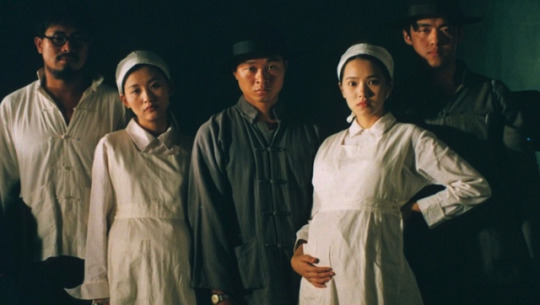
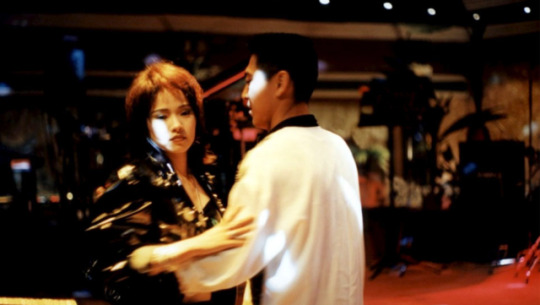

Good Men, Good Women 好男好女 (1995, dir. Hou Hsiao-hsien)
The statistics regarding the White Terror, which technically continued until the lifting of martial law in 1987, are chilling enough. Between 1949 and 1960 over 2000 people were shot and another 8000 severely punished. At most, 900 of these victims were actual Communists, while the rest were simply caught up in Chiang Kai-shek’s consolidation of power. Before martial law ended in 1987, Taiwan had a total of 29,000 political prisoners, another 140,000 who suffered hardships, and 3,000 to 4,000 who had been executed. [...] [T]he pervasively tense atmosphere and deep psychic scars it left are still evident today in the mass distrust and cynicism many Taiwanese feel towards politicians of any stripe. In her recent sophisticated study of how Taiwanese literature and cinema have depicted the traumas of the 228 Incident and afterwards, Sylvia Lin argues that this is the key meaning behind Good Men, Good Women which connects this work with the previous two films. All three films, according to her, reveal how untrustworthy visual representations of the past are, especially after decades of official repression. For her, the underlying theme of Good Men, Good Women is the ambiguous way the Taiwanese relate to the past because of the “imposed collective amnesia” resulting from forty years of martial law. In particular she notes how unresponsive Liang Jing is to the excerpts of her own diary coming back to her, that in fact she cannot deal with a personal trauma (Ah-wei’s death three years earlier) in much the same way Taiwan as a whole finds it difficult to face up to the public traumas of its long suppressed history.
James Udden, No Man an Island: The Cinema of Hou Hsiao-hsien
6 notes
·
View notes
Text
Chinese tea culture and the influence
The Chinese people, in their drinking of tea, place much significance on the act of “savoring.” “Savoring tea” is not only a way to discern good tea from mediocre tea, but also how people take delight in their reverie and in tea-drinking itself. Snatching a bit of leisure from a busy schedule, making a kettle of strong tea, securing a serene space, and serving and drinking tea by yourself can help banish fatigue and frustration, improve your thinking ability and inspire you with enthusiasm. You may also imbibe it slowly in small sips to appreciate the subtle allure of tea-drinking until your spirits soar up and up into a sublime aesthetic realm. Buildings, gardens, ornaments and tea sets are the elements that form the ambiance for savoring tea. A tranquil, refreshing, comfortable and neat locale is certainly desirable for drinking tea. Chinese gardens are well known in the world and beautiful Chinese landscapes are too numerous to count. Teahouses tucked away in gardens and nestled beside the natural beauty of mountains and rivers are enchanting places of repose for people to rest and recreate themselves.
China is a country with a time-honored civilization and a land of ceremony and decorum. Whenever guests visit, it is necessary to make and serve tea to them. Before serving tea, you may ask them for their preferences as to what kind of tea they fancy and serve them the tea in the most appropriate teacups. In the course of serving tea, the host should take careful note of how much water is remaining in the cups and in the kettle. Usually, if the tea is made in a teacup, boiling water should be added after half of the cup has been consumed; and thus the cup is kept filled so that the tea retains the same bouquet and remains pleasantly warm throughout the entire course of tea-drinking. Snacks, sweets and other dishes may be served at tea time to compliment the fragrance of the tea and to allay one’s hunger.
The formation and development of Chinese tea culture
China is the hometown of tea, is the world’s first discovery of tea, tea and the use of tea cultivation countries. The origin of tea at least the main Qi Wannian history. Tea was found and the use of human, about Siwuqiannian history.
In accordance with “The Book of Songs” and other relevant documentation, in the pre-history, “Tu” refers to all types of wild plants bitterness of food raw materials. Fresh medical unity in the history of the times, the Zhike tea vegetable oil, the Qing God, Xiaoshi, in addition to Zhang, the medical function is to facilitate wait until it is not difficult for people found. However, the general medical practices for the development of an exclusive drink often, there must also be some special factors, namely, real-life people in a particular need. Bashu region, to the multiple for Jiyi “Zhang smoke” land. “Barbarian people living with tea, the lack of will.” (Ai Qing weeks of “Zhu Guo Travels” Volume II) is often vulgar Bashu people eating spicy side, thousands of habit, still. It is this natural geographical conditions and the resulting decision of the people’s dietary practices, making Bashu people first “JIANCHALING” Apart from taking to Zhang Qi, antipyretic drugs. Jiufu-Xi, a medicinal purpose gradually Subduction, tea has become a daily drink was. Qin-Ba-Shu is likely to see this as a daily drink tea customs.
Tea from the medicinal drink into a regular habit, the strict sense of “tea” would then have its typical signs that “tea” (cha) the emergence of sound. Guo Pu Note “Yi-release”, “Jia”: “small trees such as gardenia, Dong-Sheng Ye, can be boiled for soup to drink. As early as today called for the mining, tea, who was admitted late Ming, a Chuan, Shuren of the TU. “Clearly, the Han,” Tu “has been specifically beverage word” tea “in pronunciation,” tea “from” Tu “isolated, and embarked on the” independence “road of development. But “tea” the emergence of the word is accompanied by the development of the tea things and commercial activities have become increasingly frequent, until later in the Tang Dynasty, is also in line with the new symbol of a people’s social life after such a text change in the law.
China will start from the tea, There are different theories about, the Western Han Dynasty, tea drinking has been a matter of the official literature, drinking tea when the starting time earlier than some. Tea appears to cultural characteristics, in the Han, Wei and Jin Dynasty, Northern and Southern Dynasties period.
Tea Culture Broadly speaking, the tea at the natural sciences and humanities tea in terms of both human society is in the process of the historical practice of creating and tea-related material and spiritual wealth combined. In a narrow sense, focusing on the human sciences tea, tea mainly refers to the spiritual and social functions. As the science of tea has become an independent system, which now often say the tea culture emphasis on the humanities.
The influence of tea culture on Chinese civilization
1、the three countries before the tea culture of the Enlightenment
Many of the books found that the tea set for 2737-2697 BC, its history can be pushed to Sanhuangwudi. Eastern Han Hua, “The Fresh”: “Kucha for food, meaning benefits” of the medical records of the value of tea. Western Han Dynasty tea to the country of origin named “Tu-Ling”, that is, Hunan Chaling. To San Guowei generation “-Blair” has the earliest documented the method of tea cakes and drinking: Story of the Pakistani Inter-for cake, a pie-old man leaves to a paste of rice. Tea in the form of material and infiltration to other human sciences and the formation of tea culture.
2、Jin Dynasty, the seeds of the Northern and Southern Dynasties tea culture
With the rise of the literati tea, the tea poetry Gough increasingly available, tea has been out as a general form of eating into the cultural circles, will play the spirit of social role. Jin Dynasty, Northern and Southern Dynasties period, Menfa system has been formed, not only the emperor, nobility amassed a wave of officials and scholars generally proud boast, multi-effect Plaster Liang Hou Wei. In this case, some people of insight to “Yang Lian.”
Thus, there is satisfied that the land, Huanwen to tea and wine at all. South Qishizuwu emperor is a relatively enlightened Emperor, he did not Hei Yu Yan, under Yi Zhao before his death, he said after the funeral to be thrifty as possible, not to Sansheng for offerings, only put more Ganfan, fruit cake and Chafan can. And to “the world Guijian, with such a system.” Satisfied that the land, Huanwen, Emperor Wu Qi, where tea is not only refreshing to quench their thirst, it began work in a community, into a tea hospitality, to worship and that a Kind of spirit and sentiment of the means. Tea has not entirely the use of its natural value used by the people but entered the spirit of the area.
Wei, Jin and Southern and Northern Dynasties period, the world disorder, all kinds of ideological and cultural exchanges collision, supernaturalism very popular. Metaphysics is the period of the Wei, Jin, a philosophical idea, mainly糅合Confucian thinking of the Lao Zi and Zhuang Zi-yi. Xuan Xuejia most of the so-called Fellows, the first to the door, the face, the instrument only, Hyun-loving nothingness from the light. Eastern Jin Dynasty, furans North Korea, the affluent Kangnam Scholars to be temporary to meet, hang around all day in Qingshanxiushui between the light winds to continue to develop, resulting in many light homes. Initially, there are more than idle talk Jiutu home, and later, talk of the wind gradually developed to the general literate.
Xuanxue Jia-speech, also general-talk rhetoric. Liquor make people excited, but drinking more would be stricken manner, nonsense, failed Yaguan. The tea-drinking and may be Jingri always clear, it is clear thinking, calm attitude. Moreover, the general terms of the literati, the whole day dealing with Jiurou, of the economy, will not allow. Days, many Xuan Xuejia, talk to wine home from the village. In them, where tea has been treated as a mental phenomenon.
With Buddhism, Taoism up, and have tea and Buddhism, Taoism linked. In Taoism, the tea is to help Lian “inner alchemy” or-down muddy, light-weight-for-bones, Xiu Changshengbulao a good way to the body in Buddhism, the tea is a brooding meditation required of Of the show. Although this has not yet formed a complete religious tea ceremony and the ideological principles set out tea, tea has been divorced from the diet as a form of state, has significant social, cultural functions, the Chinese tea culture clues.
3、the formation of the Tang Dynasty tea culture
780, Lu Yu, “the tea,” tea culture of the Tang Dynasty is a landmark. Tea has summed up its natural and human sciences double content of the tea arts, Confucianism, Taoism, Buddhism into the three tea, the pioneering spirit of the Chinese tea ceremony. After tea and a large number of books, poems tea, “tea in”, “JIANCHALING water”, “Cai Cha”, “16 soups.” Tang tea culture and the formation of the Zen on the rise, the benefits of tea is refreshing thought, spermatogenic Zhike function, the temple advocates tea, tea trees planted around the temple, the development of the tea ceremony, a tea appear, the first election of tea, The matter was tea activities. China’s Tang Dynasty in the form of tea ceremony at the palace tea, the tea ceremony of the temple, the literati tea ceremony.
4、 the prosperity of the Song Dynasty tea culture
Song tea has been a great development, and promote the development of the tea culture, the literati in a professional Tea Associations, an official of the “social soup”, a Buddhist, “1,000 clubs.” Song Taizu Zhao Kuangyin tea is an of disabilities, in court and authorities in the establishment of tea things, the court has been using tea grades. Tea-ceremony system has become, thanks to the win over Secretary of tea has become the emperor, with relatives an important means, but also give foreign envoys. As for the lower social and vitality of tea culture is more lively, some of movement, the neighbourhood to “Xiancha” You Ke, to respect the “gold ingot tea”, when engaged to “tea”, the time of the marriage to “the tea”, when roommate “A tea.” Cha Doo civil wind has brought Preparing cooking point of a series of changes.
Since the Yuan Dynasty, the tea culture has entered a period of twists and turns. Song expansion of the tea culture and the social dimension of cultural forms, tea things are booming, but the tea to complicated, trivial, luxury, lost the Tang Dynasty tea culture profound ideological connotation, too delicate tea flooded the spirit of the tea culture, lost Its noble profound nature. In court, nobles, scholars there, drinking tea became a “drink at the child” and “drinking style,” and “Play tea.”
5、 that the universal culture of Qing-Cha
At this point there has been steaming green, Chaoqing, Hong Qing, and other tea, tea drinking has been changed to “minority bubble”, many of the Ming Dynasty scholar Aston handed down the left for, such as snow star “Pengcha picture,” ” Tea map “, Wen Zhengming’s” Huishan tea party “,” Lu Yu Pengcha plans, “Tea plans. ” The increase in tea, tea art is different, the style of Tea Ware, texture, pattern Qianzibaitai. Tea exports to the Qing Dynasty have become one of the official sector, the tea, tea, tea countless poems.
6、 the development of modern tea culture
After the founding of New China, China’s annual output of tea from 1949 to 7500 T development in 1998, more than 60 million T. Tea a substantial increase in material wealth for the development of China’s tea culture to provide a solid foundation in 1982, set up in Hangzhou, the first to promote tea culture for the purpose of social groups – the “tea house”, established in 1983 in Hubei ” Lu Yu Tea Culture Research Society, “1990” were the Federation of Chinese tea “was set up in Beijing, 1993,” the China International Tea Culture Research Society “in the establishment of Island Lake, in 1991 China Tea Museum in Hangzhou West Lake Township officially opened. 1998 China International Tea Cultural Exchange Peace Museum completed. With the rise of tea culture and tea houses throughout the run more.
International Tea Culture Symposium has been opened to the fifth sector, has attracted Japan, South Korea, the United States, Sri Lanka and Hong Kong and Taiwan has participated. The main provincial cities and counties in the tea production in the host “Tea Day”, such as Fujian’s Wuyi Yancha section of the city, Yunnan’s Pu’er tea festival, Zhejiang Xinchang, Taishun, Hubei and Britain Hill, the Tea Festival in Xinyang, Henan abound. To have tea as the carrier, to promote comprehensive economic and trade development.
Chinese tea culture and tea culture in Europe and America or Japan, a great difference. Chinese tea culture has a long history, profound, not only contains the material and cultural level, also contains a deep spiritual level. Tea by Lu Yu of the Tang Dynasty in the history of Chinese tea culture and sounded the horn. Since then, the spirit of tea permeates the court and society, into the Chinese poetry, painting, calligraphy, religion, medicine. For thousands of years, China has not only accumulated a great deal about tea cultivation, production of material culture but also accumulated rich spirit of the tea culture, which is unique to China’s tea culture, a cultural study area.
12 notes
·
View notes
Photo
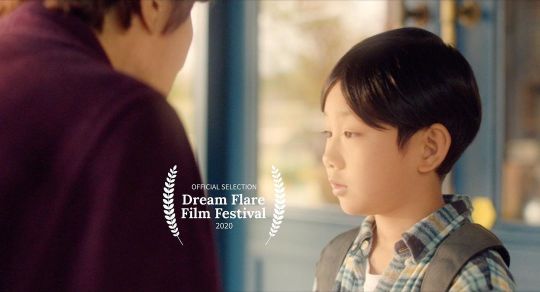
Ahma & Alan (@ahmaandalan) is playing 11/14 to 11/20 at the Dream Flare Film Festival (@_dreamflareff_ ! Produced by @aikhunentertainment, DFFF aims to share the beauty of cinema, taking Taiwan as a source of inspiration. To watch my film, get tickets here (link also in IG bio): https://www.eventbrite.com/e/dfff-2020-ahma-alan-tickets-127261258851 My film will be playing alongside some great shorts, some of which were an official selection of the Taipei Film Festival. Funny story, earlier this year I tried to submit my short film to Taipei Film Festival but found out I couldn’t because on paper, I’m just American. HAHA! (TFF only accepts short films from Taiwanese nationals). It’s all good, I think it’s really important to bring up and support local filmmakers, which I think is the intention behind the rule, and Taiwan has some amazing filmmakers I look forward to watching. An honor to be part of this festival. Hope you can join us! (note: films can only be watching within the U.S.). Ahma & Alan (a 23 min short film) Starring: Mei-Hou Wu, @gregory.yuan, Akio Chen Executive Producer: @caraichiu Producers: @fabulous_sugar_c, Su-Jean Chiang, Betty Chung Director of Photography: @richardsjsue Gaffer & Emotional Support: Tan Chi Liang Production Designer & Costume Design: @skylerchen Art Director & Wardrobe: @roderick.c.t. Hair & Makeup: Anny Roan Assistant Director: @civilized133 Sound Mixer: @t7963t Editor: @chun7211 Music by @royersueno …and many more! 好開心我們的短片”阿嬤與阿倫“有加入夢花國際影展11月14日到11月20日!: https://www.eventbrite.com/e/dfff-2020-ahma-alan-tickets-127261258851 夢花國際影展是想跟不同的國家分享電影的魅力。影展是從台灣有受到大的印象。 我的短片也跟一些台北電影節的短片有進入。覺得有點好笑,我年初想申請台北電影節但是發現關於短片的話,他們只能收有台灣國籍的導演。在紙面上我只是一位可憐美國人,😄 GO USA! 哈哈。沒關係,我覺得他們這樣規定應該是為了給台灣導演們個平台可以發揮一下。我覺得這也很重要,我個人很期待看台灣的導演將來會拍什麼樣的作品。 進入夢花國際電影展覺得很光榮。希望您們能跟我們一起吧!(備註:只能在美國看影展的片)。 阿嬤與阿倫 主演 吳美和,袁積友,陳慕義 監製 邱宜貞 製片 施忻宜,江淑瑾,鍾麗雲 攝影師 蘇士傑 燈光指導和心理導師 譚紀良 美術/服裝設計師 陳柏豪 美術/服裝助理 曾柏淳 梳化師 阮鳳琴 副導演 吳溎七 現場收音師 張勤 剪接師 高魁駿 原創音樂 孫啟武 #美國 #台灣 #短片 #亞裔 #華僑 #阿嬤 #奶奶 #影展 #台北 #鹿港 #shortfilms #asianamericanfilm #taiwan #taiwaneseamerican #taipei #lukang https://www.instagram.com/p/CHr8_4apH4U/?igshid=pythra6tc8e5
0 notes
Text
Amizade de Hou Liang e Fujioka Daichi é assunto entre os fandoms
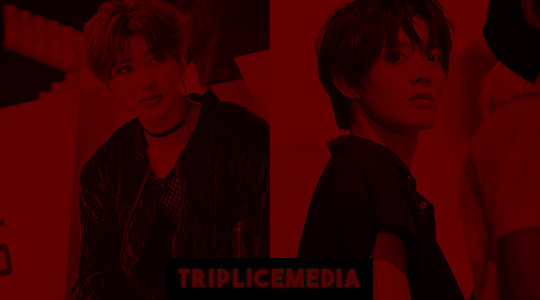
Desde que Hou Liang, vocalista principal do Kronos, e Fujioka Daichi do Wish estiveram na Radio Star e revelaram que participaram de um programa semelhante ao H Producer, além de posteriormente Kim Gura descobrir que os dois rapazes eram amigos desde essa época em outro país, o fandom do Kronos e do Wish ficaram eufóricos com essa suposta e inusitada amizade. Os dois rapazes nunca interagiram publicamente, mas tiveram uma ótima química ao cantarem na Rádio Star.
Um vídeo feito por uma fã chinesa tornou-se assunto quente do momento ao viralizar no youtube e rapidamente passar para outras redes. Na compilação há partes de vídeos onde mostram Hou Liang e Fujioka Daichi agindo com naturalidade e amizade entre si. Desde a skinship e tratamento informal durante a compilação. Partes de quando eram apenas trainees em uma empresa na China e praticavam. Também no programa competindo e se divertindo. Uma parte em particular tomou atenção de geral quando ambos foram anunciados como classificados para primeira fase do programa, semelhante ao H Producer, e se abraçaram emocionados com a conquista um do outro.
As fãs rapidamente perceberam que amizade dos vocalistas é antiga e muito bonita e levantaram uma hashtag #HouFujiFriendship para os artistas logo após a viralização desses momentos.
para comentar a notícia, nos mandem uma ask com a tag: #noteth389.
#note: hou liang.#note: fujioka daichi.#note: kronos.#note: wish.#note: haven.#note: h.light.#noteth389.
1 note
·
View note
Photo

ℤ𝕙𝕠𝕦 𝕄𝕖𝕚 𝕠𝕗 𝕃𝕚𝕒𝕟𝕘 (𝕊𝕚𝕕𝕖 ℂ𝕙𝕒𝕣𝕒𝕔𝕥𝕖𝕣)
𝓑𝓮𝓽𝓻𝓸𝓽𝓱𝓮𝓭?
Yes, to Princess Ayleanna “Lea” Lynton of Aciras
𝓗𝓮𝓲𝓻?
Yes
𝓕𝓪𝓬𝓮𝓬𝓵𝓪𝓲𝓶
Guanchen Liu
𝓟rince 𝓩hou 𝓜ei is the heir to the Liangii throne and Princess Lea's husband-to-be. He is the illegitimate son of Emperor Ming Mei (who, as hard to imagine as it may be, was once young and foolish), and he was raised by his mother's brother, the captain of an infamous group of pirates and outlaws. As such, Zhou grew up a rowdy and rambunctious child, and this certainly didn't magically go away during his teenage years. 𝓩hou had just turned sixteen when he found a letter from his mother that brought his true heritage to light. Instead of waiting around for his uncle to find out, Zhou simply left him a note and slipped away to Xiajing, where he (quite literally) kicked down the palace doors and demanded an audience with the emperor. 𝓛ong story short, Emperor Ming confirmed Zhou's heritage and named him the heir to the Liangii throne, after some deliberation. The media has dubbed Zhou as the "long lost prince of Liang" or the "pirate prince", and Zhou has definitely lived up with his reputation-the dude has no idea how to be royal at all, despite his cousin Mai's best efforts. Zhou is now 23 years of age. He will be joining his cousin in Aciras two weeks before the wedding, as it is considered bad luck by the Liangii for the groom to see too much of the bride before the wedding.
0 notes
Text
How Taiwan Is Becoming a Global Hub for Creative Content — Hollywood Reporter
Read more at the Hollywood Reporter
— by Melissa Locker: The creative class in Taiwan has been pushing the boundaries in culture for decades with groundbreaking films, books, music and, more recently, virtual reality projects. The nation is investing heavily in culture and the people that drive it, garnering attention from creative industries around the world…
Image courtesy of TAICCA
View On WordPress
#2020 Berlinale#2020 Culture X Tech Next#A Brighter Summer Day (1991)#A City of Sadness (1989)#Berlin International Film Festival#Crystal Boys (2003)#Days (2020)#Edward Yang#Gloomy Eyes (2019)#Hollywood Reporter#Hsiao-Hsien Hou#Hsin-Chien Huang#Jui-Yuan Tsao#La Camera Insabbiata (2018)#Laurie Anderson#Miao-Jin Qiu#Ming-Liang Tsai#Ming-Liang Tsai The River (1997)#Notes of a Crocodile (1994)#Rizi (2020)#TAICCA#Taiwan Creative Content Agency#VR
0 notes
Note
You mentioned before that Wu’s historians appear to have done some mucking around in Sun Jian’s life. What did they do exactly?
Probably the best example is a lengthy passage from Sun Jian’s campaign against the Liang rebels.
Zhang Wen called on Dong Zhuo by Imperial decree but he tarried for a long time before answering the summons. Zhang Wen reprimanded Dong Zhuo for this but he countered and would not obey. At the time Sun Jian was seated in attendance, and whispered in Zhang Wen’s ear: “Dong Zhuo acts and speaks arrogantly because he has no fear of being punished. He should be beheaded for not answering your summons in due time, according to military law.”
Zhang Wen said: “Dong Zhuo is famed throughout the lands of Long and Shu. To kill him on this day would impede the advance westwards.”
Sun Jian said: “My enlightened lord leads Imperial troops and your authority makes all under heaven tremble, what need do you have of Dong Zhuo? Examining Dong Zhuo’s words, he does not even pretend courtesy toward you and observes no respect to his superiors. This is his first crime. Bian Zhang and Han Sui have defied the law for more than a year and now is the time to advance and subdue them. Yet Dong Zhuo says that we should not do so yet. He is holding up the army and making the people uncertain. This is his second crime. Dong Zhuo has accepted his assignment but is without results. He answered your summons slowly and yet he acts proudly and holds himself highly. This is his third crime. The famed generals of antiquity, commanded their host with the symbolic Battle-axe and whilst on campaign, there were none who would not behead a man to show their authority. This is how Sima Rangju beheaded Zhuang Jia and Wei Jiang killed Yang Gan. Today my enlightened lord has extended his consideration to Dong Zhuo, but refrains from punishing him, thus rendering great harm to the authority of military law. This much is clear.”
Zhang Wen could not bear to issue the command and so he said: “You should return or Dong Zhuo may become suspicious.”
Sun Jian got up and went out. Bian Zhang and Han Sui heard of the great army that was approaching; their confederates and followers scattered and begged to surrender. The Imperial army returned after this but the court advisors held that they had not actually fought the enemy and so no honours were granted. When it was told, however, how Sun Jian had tallied Dong Zhuo’s three crimes and urged Zhang Wen to behead him, none did not sigh in admiration.
Rafe de Crespigny (in his Generals of the South) suspects that this story is a falsehood.
To make a long story short, the SGZ account (based on the Wu Shu) contradicts other versions, including the words of Dong Zhuo himself (spoken to the historian Liu Ai). It’s probable that Wu historians (potentially at Sun Hao’s command) altered their own records of Sun Jian’s campaign to cast him in opposition to Dong Zhuo, making them enemies instead of comrades.
Of it, de Crespigny says:
According to this, Zhang Wen brought his army to Chang'an, and from there he summoned Dong Zhuo. Dong Zhuo, however, was slow to come and when he did arrive he was discourteous and insubordinate. Sun Jian, who was in attendance on Zhang Wen, then presented a lengthy argument, with historical examples and allusions from the classics, urging that Dong Zhuo should be executed for his refractory behaviour towards his superior officers. Since the speech is described as being delivered in a whisper to Zhang Wen alone, it is difficult to see how it could have been recorded at the time, and it is impossible to rely upon the account as it is presented. It is, perhaps, just possible that at some stage in the campaign Dong Zhuo objected to his orders, and Sun Jian then urged Zhang Wen to punish him.
On the other hand, Dong Zhuo was in fact Zhang Wen's most successful commander. He had done well in the earlier abortive campaign under Huangfu Song, and he played a great part in the victory of Meiyang which eventually caused the withdrawal of the enemy to the west. Moreover, in the commentary of Pei Songzhi to a later part of the biography of Sun Jian, there is an extract from the book Shanyang gong zaiji which contains a record of a discussion of this campaign by Dong Zhuo himself. Like any version of direct speech in the histories, the passage must be suspect, but Dong Zhuo is described as speaking with the historian Liu Ai, and Liu Ai may well have kept a note of the incident.
According to this record from Shanyang gong zaiji, when Zhang Wen proposed to send Zhou Shen and Dong Zhuo in command of separate columns to the west, Dong Zhuo suggested that the two units should nevertheless co-operate, and that he should remain as reserve in the rear while Zhou Shen led his men against the enemy. His idea was that the rebels would be afraid to commit themselves against Zhou Shen for fear they would then be attacked by Dong Zhuo's force. Dong Zhuo was concerned that if the two armies went forward independently, the rebels would beable to watch both columns, concentrate their forces where theywished, and attack them separately. In fact, this is what happened.The two parts of the imperial force were each caught by the enemyin unfamiliar country with extended lines of communications.Dong Zhuo was surrounded by the Qiang and had to trick his wayout, while Zhou Shen was also caught by a counter-attack andabandoned his baggage train as he fled.
Dong Zhuo went on to say that Sun Jian had proposed much thesame strategy to Zhou Shen as he had to Zhang Wen: that ZhouShen should use the majority of his troops to establish a securebase while Sun Jian went forward with a detachment. The enemywould be tied down by the threat of the main attack, and Sun Jianand his troops could raid their strong points and theircommunications without interference. An army of rebels would be afraid to engage any part of the imperial forces in a major battle,because they could be held in that engagement and crushed whenthe main body came up. Like Zhang Wen, however, Zhou Shenrefused to accept the strategy.
The plan that Sun Jian proposed to Zhou Shen is also mentionedin Hou Han shu, and that account is clearly based on Shanyanggong zaiji. Surprisingly, however, the main text of the biographyby Sun Jian in Sanguo zhi makes no mention of his proposal.Instead, we are told that when the rebels heard how Zhang Wen'sgreat army was coming against them, they“separated and scattered and all begged to surrender. Then thearmy came home, but the imperial advisers held that since theyhad not actually fought with the enemy, it was not appropriateto give any rewards.”
This is quite wrong. The imperial army had fought a battle atMeiyang, but the rebels had not been scattered and they did notsurrender in any numbers. The account in Sun Jian's biography iscontradicted by all other records of the rebellion in Liang province.It may be that the biographer sought to explain why Sun Jianreceived no immediate reward when he came back to the capital, orhe may have been so concerned to show Sun Jian's disapproval ofDong Zhuo that it would have been embarrassing to describe them as suggesting similar strategies. In either case, this is one example of how unreliable such a text can be when the hero of the story is a minor figure in the events described, and when those events occurred at such a distance of time and space.
3 notes
·
View notes
Text
Kronos no programa de rádio Night Club
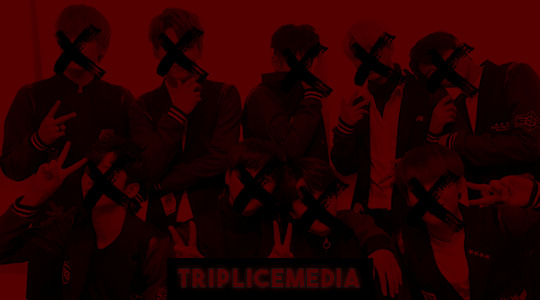
Na noite de segunda feira (13/08), o programa de Son Jiyoung recebeu a visita dos meninos do grupo Kronos. Durante o programa, o rapper do Icarus conversou com os meninos que falaram sobre como era diferente a rotina de um idol comparada a de um trainee, sobre a sensação de estar no palco na primeira vez e até mesmo brincaram conversando sobre os tempos do Producer, no qual Jiyoung foi instrutor. Durantes as brincadeiras, o rapper principal do Kronos perguntou a seu sunbae se ele preferia as meninas do supernova e o apresentador não hesitou em responder que sim, em uma clara brincadeira, fazendo com que o mais novo levanta-se de sua cadeira e começasse a chamar os amigos para sairem dali pois eles não eram amados ali; o grupo também contou histórias engraçadas sobre o período em que estão morando juntos e contaram diversas vezes que os membros estrangeiros do grupo acabaram confundindo alguma palavra, além de declararem que estão todos ali tentando se ajudar. No fim do programa, os meninos postaram em suas redes sociais uma foto com o rapper e também um pequeno vídeo onde ele fazia o rap do single Oblivion, escrito por Youngwoon.
para comentar a notícia, nos mandem uma ask com a tag: #noteth436.
#note: kronos.#note: haven.#note: h.m.#note: h.light.#note: moon dokeun.#note: hou liang.#note: jung chinhae.#note: yhukon inchaeron.#note: lee yunho.#note: choi daejung.#note: nate huang.#note: huang guanyu.#note: texas hong.#noteth436.
0 notes